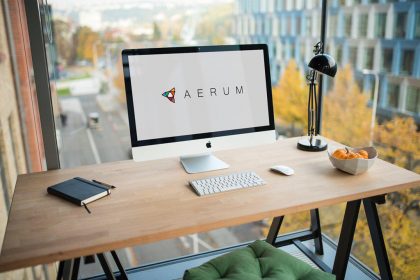A new project Aerum will challenge the current issues of blockchain technology with its “number one” Ethereum-based platfrom.
Over the recent years, blockchain technology has changed people’s everyday life greately. Bitcoin was the first thing to revolutionize the world. Currently, this digital asset is leaning back a bit for the reason of strong competition. In comparison to Bitcoin, which was designed as a purely financial solution, its major competitor Ethereum provides grounds for a number of concepts.
However, new technologies never come without a challenge. As the number of projects and transactions on the network grows, it faces a wide range of issues, such as long transaction execution time, low general throughput, prohibitive and highly volatile cost of trivial transactions, unscalable Proof-of-Work mining and unsatisfactory user experience.
This is where a new infrastructure project Aerum enters the game. The main goal of the project is to disrupt the FinTech industry by introducing free, real-time transactions, highly scalable smart contract protocol, optimized for tokenization and trustless financial operations, with the help of its next generation Blockchain for programmable P2P finance.
According to the whitepaper, Aerum aims to provide a fullservice solution for launching financial marketplaces, gaming ecosystems and prediction markets through its unique offering. The project is ambitious to become a number one Ethereum-based platform with virtually unlimited scalability.
However, competing with Ethereum is not a part of Aerum’s plan. The project will only supplement Ethereum platform as a high performance smart contract protocol with decentralized governance, leveraging its high security level and staking mechanisms.
Aerum’s solution represents itself a fully Ethereum/Solidity/dApp compatible platform with large powerful blocks capable of working with complex contracts, and powerful cross chain atomic swaps allowing easy, intuitive token transfer between Aerum and Ethereum right in the wallet.
The new platfrom will offer free transactions for end-users and quite cheap for business participants. High levels of speed and security will also be provided. The network will benefit high potential throughput and scalability, while being 99.9% available. Moreover, practical governance model will be optimal for the business requirement.
High levels of decentralization will be reached due to unique consensus algorithm ATMOS, which leverages delegated Proof-of-Stake system capable of servicing whole network of blockchains. The platform’s multi-function, customizable wallet app will support atomic swaps, tokens, delegate staking, token issuance and many more.
Business participants will have an opportunity to perform core transactions and cross chain operations without any blockchain programming due to an oriented application Middleware dApp. The platform will also include a fully-integrated Decentralized Aerum Token Exchange and Multi-Token payment engine, which will allow for automatically converting assets.
The main idea of the project was initially formulated in November 2017, when the team started the platform’s development. In August 2018, Aerum released its beta version, which included Aerum Web Wallet, Aerum Mobile Wallet, Aerum Intergration Toolkit, Consensus protocol and Token Staking protocol.
The token sale has officially started on September 17, 2018, and is currently on its second round. The end of the public sale is set on January 31, 2019. The soft cap and the hard cap of the sale are estimated at 5 million USD and 20 million USD in Ether respectively.
The token allocation is as follows: 10% will go to the founders, 10% to the team and advisors, 10% will be spend on marketing and legal purposes, 60% will be allocated to the token sale and, finally, 10% will be spend on the platfrom’s further development.
next